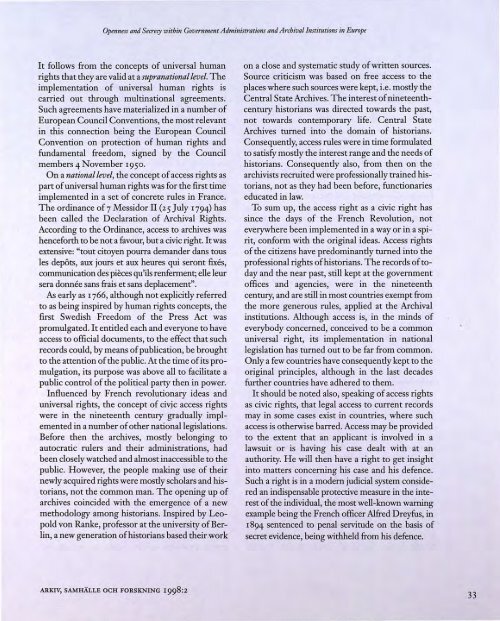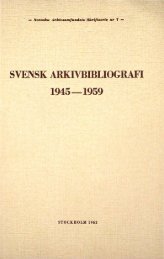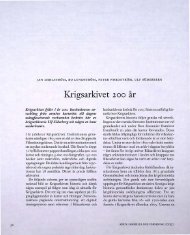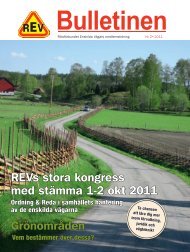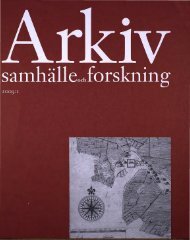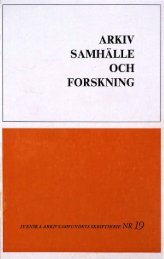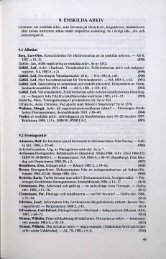Redaktionen har ordet - Visa filer
Redaktionen har ordet - Visa filer
Redaktionen har ordet - Visa filer
You also want an ePaper? Increase the reach of your titles
YUMPU automatically turns print PDFs into web optimized ePapers that Google loves.
Openness and Secrecy with in Government Administrations andArchival Institutions in Europe<br />
lt follows from the concepts of universal human<br />
rights that they are valid at a supranationallevel. The<br />
implementarian of universal human rights is<br />
carried out through multinational agreements.<br />
Such agreements have materialized in a number of<br />
European Council Conven tians, the most relevant<br />
in this connection being the European Council<br />
Conventian on protection of human rights and<br />
fundamental freedom, signed by the Council<br />
members 4 November I950.<br />
On a national leve!, the concept of access rights as<br />
part of universal human rights was for the first time<br />
implemented in a set of concrete rules in France.<br />
The ordinance of 7 Messidor II (2 5 July I 794) has<br />
been called the Declaration of Archival Rights.<br />
According to the Ordinance, access to archives was<br />
henceforth to be not a favour, bu t a civic right. lt was<br />
extensive: "tout citoyen pourra demander dans tous<br />
les depöts, aux jours et aux heures qui seront fixes,<br />
communication des pieces qu'ils renferment; elle leur<br />
sera donnee sans frais et sans deplacement".<br />
As earlyas I 766, although not explicitly referred<br />
to as being inspired by human rights concepts, the<br />
first Swedish Freedom of the Press Act was<br />
promulgated.lt en ticled each and everyone to have<br />
access to official documents, to the effect that such<br />
records could, by means of publication, be brought<br />
to the attention of the public. At the time of its promulgation,<br />
its purpose was above all to facilitate a<br />
public control of the political party then in power.<br />
lnfluenced by French revolutionary ideas and<br />
universal rights, the concept of civjc access rights<br />
were in the nineteenth century gradually implemented<br />
in a number of other nationallegislations.<br />
Before then the archives, mostly belonging to<br />
antaeratic rulers and their administrations, had<br />
been closelywatched and almostinaccessible to the<br />
public. However, the people making use of their<br />
newly acquired rights were mostly schalars and historians,<br />
not the common man. The opening up of<br />
archives coincided with the emergence of a new<br />
methodology among historians. lnspired by Leopold<br />
von Ranke, professor at the ulliversity of Berlin,<br />
a new generation ofhistorians based their work<br />
on a close and systematic study of written sources.<br />
Source criticism was based on free access to the<br />
places where such sources were kept, i.e. mostly the<br />
Central State Archives. The interest of nineteenthcentury<br />
historians was directed towards the past,<br />
not towards contemporary Iife. Central State<br />
Archives turned inta the domain of historians.<br />
Consequently, access rules were in time formulated<br />
to satisfy mostly the interest range and the needs of<br />
historians. Consequently also, from then on the<br />
archivists recruited were professionally trained historians,<br />
not as they had been before, functionaries<br />
educated in law.<br />
To sum up, the access right as a civic right has<br />
since the days of the French Revolution, not<br />
everywhere been implemented in away or in a spirit,<br />
conform with the original ideas. Access rights<br />
of the citizens have predominantly turned in to the<br />
professional rights ofhistorians. The records of today<br />
and the near past, still kept at the government<br />
offices and agencies, were in the nineteenth<br />
century, and are still in most countries exempt from<br />
the more generons rules, applied at the Archival<br />
institutions. Although access is, in the minds of<br />
everybody concerned, conceived to be a common<br />
universal right, its implementarian in national<br />
legislatian has turned out to be far from common.<br />
Only a few countries have consequently kept to the<br />
original principles, although in the last decades<br />
further countries have adhered to them.<br />
lt should be noted also, speaking of access rights<br />
as civic rights, that legal access to current records<br />
may in same cases exist in countries, where such<br />
access is otherwise barred. Access may be provid ed<br />
to the extent that an applicant is invalved in a<br />
lawsuit or is having his case dealt with at an<br />
authority. He will then have a right to get insight<br />
inta matters concerning his case and his defence.<br />
Such a right is in a modern judicial system considered<br />
an indispensable protective measure in the interest<br />
of the individual, the most well-known warning<br />
example being the French officer Alfred Dreyfus, in<br />
I894 sentenced to penal servitude on the basis of<br />
secret evidence, being withheld from his defence.<br />
ARKIV, SAMHÄLLE OCH FORSKNING I998:2<br />
33


